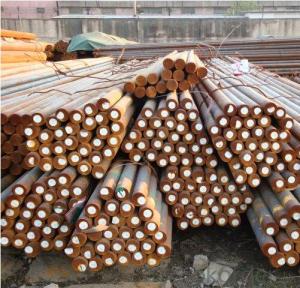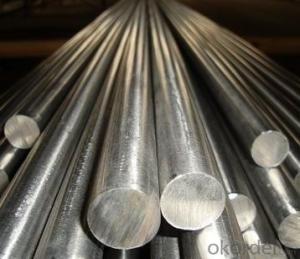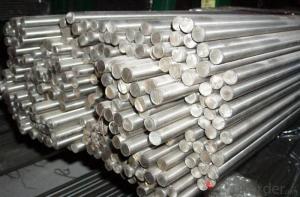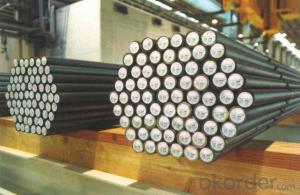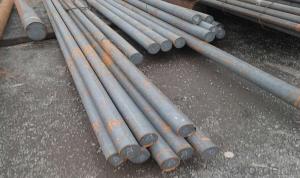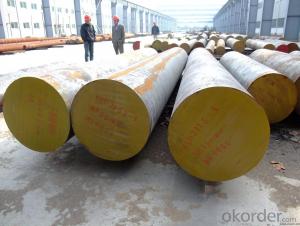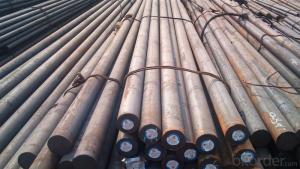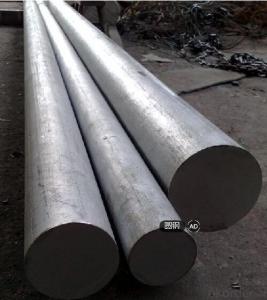SKD11 Hot Rolled 12mm Steel Rod 1.2379 Steel Round Bar
- Loading Port:
- China main port
- Payment Terms:
- TT or LC
- Min Order Qty:
- 25 m.t.
- Supply Capability:
- 10000 m.t./month
OKorder Service Pledge
OKorder Financial Service
You Might Also Like
Specification
1. Main application of skd11 steel:
(1) Thickness of not more than 2MM sheet, efficient blanking die, punch die and pressure die etc.
(2) All kinds of scissors, inserts, woodworking blade.
(3) Thread rolling die and wear-resistant slider.
(4) Cold Heading Die, thermosetting resin molding.
(5) Molding in deep drawing cold extrusion dies
2. Specification of skd11 steel:
Round bar | Diameter(mm) | Length (mm) | |
10~800 | 2000~5800 | ||
plate/sheet | Thickness(mm) | Width (mm) | Length (mm) |
10~800 | 80~2300 | 2000~5800
|
3. Delivery condition of skd11 steel:
Acc. to your request—Standard steel bar(sawing)
——non-standard steel bar(sawing)
or Mill deliver condition,without sawing or cutting
Conventional or ESR, hot rolled or forged, black surface or milling
Hardness: annealed to HB≤255
4. Features of skd11 steel:
(1) Good quenching resistance, heat deformation small, wear-resistant, impact resistant.
(2) Vacuum degassing refining processing pure steel.
(3) Spheroidizing softening process, good cutting performance.
(4) Strengthen the elements vanadium, molybdenum special join, is extremely excellent in wear resistance.
5. Chemical analysis of skd11 steel:
C | Si≤ | Mn≤ | P≤ | S≤ | Cr | Mo | V |
1.40~1.60 | 0.40 | 0.60 | 0.030 | 0.030 | 11.0~13.0 | 0.80~1.20 | 0.20~0.50 |
6. Compared grades of skd11 steel(based on usage)
Chinese | American | German | Swedish | Japanese |
GB | AISI | DIN | ASSAB | JIS |
Cr12Mo1V | SKD11 |
7. Heat treatment of skd11 steel (for reference)
quenching | quenching hardness | tempering | Tempering hardness |
1020~1040 °c | 58~60HRC | 150~200 °c | 62~63HRC |
Product show
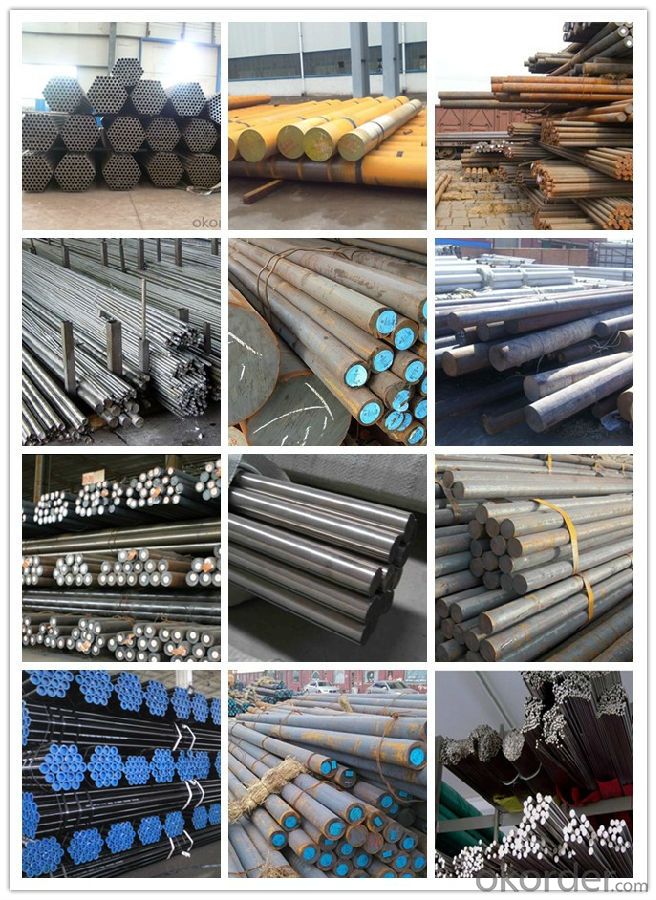
Workshop show
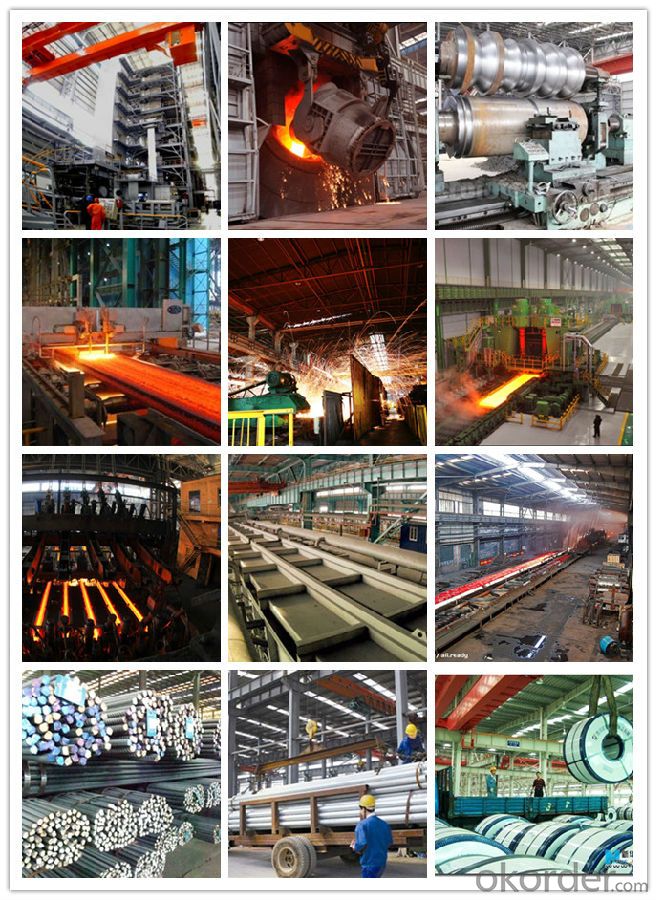
- Q: How is magnetic stainless steel used in the production of magnetic components?
- Magnetic stainless steel is used in the production of magnetic components due to its unique properties. It possesses both the corrosion resistance of stainless steel and the magnetic properties required for applications such as motors, transformers, and magnetic assemblies. The steel is typically alloyed with elements like nickel, manganese, and nitrogen, which enhance its magnetic properties. This allows for the manufacturing of reliable and efficient magnetic components that are resistant to rust and can withstand harsh environments.
- Q: Can special steel be used in the defense sector?
- Indeed, in the defense sector, special steel finds itself as a viable option. Special steel, which encompasses alloys or compositions designed with specific attributes such as high strength, hardness, resistance to corrosion, or heat resistance, proves to be suitable for a range of defense applications. These applications include the construction of armored vehicles, naval vessels, aircraft, and weaponry. Within the defense sector, special steel serves as a valuable resource for manufacturing components and structures necessitating exceptional strength and durability. For instance, it can be utilized to produce armor plates for tanks and armored vehicles, which must endure high impact and ballistic threats. Additionally, special steel can be employed in the construction of naval vessels, providing corrosion resistance and enhancing overall structural integrity. Furthermore, the defense industry heavily relies on special steel for manufacturing aircraft parts and weaponry. Aircraft components, such as landing gear, engine parts, and structural elements, demand materials of high strength to ensure safe and reliable operation. Special steel alloys fulfill this requirement by providing the necessary strength and resistance to extreme conditions, including high temperatures and pressures, making them an ideal choice for these applications. Moreover, special steel plays a vital role in the production of various types of weapons, such as firearms and blades. Its exceptional strength and hardness properties render it suitable for manufacturing gun barrels, bulletproof vests, and knives employed by military personnel. To summarize, special steel holds significant value within the defense sector due to its exceptional properties, including strength, hardness, corrosion resistance, and heat resistance. Its extensive applications in the construction of armored vehicles, naval vessels, aircraft, and weaponry ensure the safety, durability, and effectiveness of military equipment.
- Q: What are the different applications of tool special steel?
- Tool special steel is a versatile material with unique properties that finds applications in various industries. Some of the diverse uses of this steel include: 1. Cutting Tools: In the manufacturing of drills, saw blades, milling cutters, and lathe tools, tool special steel is widely employed. Its exceptional hardness, wear resistance, and toughness ensure long tool life and superior cutting performance. 2. Dies and Molds: Tool special steel is extensively used in the production of dies and molds for metalworking and plastic injection molding processes. It is suitable for these demanding applications due to its ability to withstand high temperatures, resist wear and deformation, and maintain dimensional stability. 3. Automotive Industry: Tool special steel is employed in the automotive industry for various components such as crankshafts, gears, camshafts, and engine valves. Its outstanding strength, fatigue resistance, and heat resistance qualities contribute to the overall durability and performance of automotive parts. 4. Aerospace Industry: The aerospace industry utilizes tool special steel for applications such as turbine blades, aircraft engine components, landing gears, and structural parts. Its high strength, corrosion resistance, and ability to withstand extreme temperatures and pressure make it an ideal choice for these critical applications. 5. Construction and Mining: In the construction and mining sectors, tool special steel is used for equipment like excavator buckets, rock drills, bulldozer blades, and drilling bits. Its remarkable hardness, toughness, and resistance to abrasion enable these tools to withstand the harsh conditions encountered in these industries. 6. Tooling Industry: In the tooling industry, tool special steel is extensively employed in the manufacture of various types of tools and equipment. Hand tools, power tools, and precision instruments all benefit from the exceptional strength, hardness, and resistance to wear and deformation of tool special steel. 7. Medical Industry: In the medical field, tool special steel is utilized for the production of surgical instruments, orthopedic implants, and dental tools. Its biocompatibility, corrosion resistance, and ability to be sterilized make it suitable for these critical applications. These examples highlight the numerous applications of tool special steel. Its unique properties make it a valuable material in various industries where durability, strength, and precision are essential requirements.
- Q: How does special steel perform in terms of chemical resistance?
- Special steel has excellent chemical resistance properties, making it highly resistant to corrosion and oxidation. It is capable of withstanding exposure to various chemicals, acids, and corrosive environments without undergoing significant degradation. This makes special steel a reliable choice for applications that require strong resistance against chemical attack.
- Q: How does special steel contribute to the construction machinery industry?
- Special steel contributes to the construction machinery industry by providing high strength and durability to the equipment. This type of steel is designed to withstand extreme conditions, such as heavy loads, vibrations, and harsh environments. It enhances the performance and lifespan of construction machinery, allowing for efficient and reliable operation. Additionally, special steel's unique properties enable the construction of lighter and more robust equipment, leading to improved fuel efficiency and cost-effectiveness.
- Q: How does the composition of special steel affect its mechanical properties?
- The composition of special steel significantly affects its mechanical properties. Various alloying elements such as carbon, manganese, chromium, nickel, and others are added in specific quantities to enhance the steel's strength, hardness, toughness, and corrosion resistance. The presence and ratio of these elements determine the steel's microstructure, which in turn determines its mechanical properties. For example, higher carbon content increases hardness and strength, while manganese improves toughness. Similarly, chromium and nickel increase corrosion resistance and provide better heat resistance. Therefore, the composition of special steel plays a crucial role in defining its mechanical properties.
- Q: How does special steel contribute to the renewable energy sector?
- Special steel plays a crucial role in the renewable energy sector by enabling the development and production of efficient and durable components for renewable energy technologies. For example, special steel is used in the manufacturing of wind turbine towers, blades, and foundations, ensuring their structural integrity and longevity. It is also utilized in solar panel frames, supporting structures, and transmission systems, enhancing their resilience and performance. Additionally, special steel is essential in the construction of hydroelectric power plants, ensuring the strength and reliability of penstocks, turbines, and other critical components. Its unique properties and characteristics contribute significantly to the overall efficiency, sustainability, and cost-effectiveness of renewable energy systems.
- Q: What are the different types of high-strength steel?
- There are several types of high-strength steel, including high-strength low-alloy (HSLA) steel, ultra-high-strength steel (UHSS), dual-phase (DP) steel, and transformation-induced plasticity (TRIP) steel. Each type has unique properties and is used in various industries for applications that require exceptional strength and durability.
- Q: How does special steel perform in high-temperature fatigue resistance?
- Special steel is known for its excellent performance in high-temperature fatigue resistance. Unlike ordinary steel, special steel contains alloying elements such as chromium, nickel, and molybdenum, which enhance its mechanical properties and resistance to fatigue at elevated temperatures. At high temperatures, the microstructure of special steel undergoes significant changes, which can lead to the initiation and propagation of cracks. However, the presence of alloying elements in special steel helps to stabilize the microstructure, preventing the formation and growth of cracks. This ensures that the material can withstand cyclic loading and retain its structural integrity even under extreme temperature conditions. Additionally, special steel exhibits superior heat resistance, which allows it to maintain its mechanical strength and hardness at high temperatures. This property is crucial in applications where components are subjected to repetitive thermal cycles or exposed to continuous high temperatures, such as in gas turbines, power plants, and aerospace engines. Furthermore, the high-temperature fatigue resistance of special steel is also influenced by its composition and heat treatment. Through precise control of the alloying elements and appropriate heat treatment processes, the material's fatigue life and resistance to thermal fatigue can be further enhanced. In conclusion, special steel performs exceptionally well in high-temperature fatigue resistance due to its unique composition and microstructure. Its ability to withstand cyclic loading, maintain mechanical properties, and resist crack formation under extreme temperature conditions makes it a preferred choice for demanding applications in various industries.
- Q: How does special steel contribute to the defense sector?
- Special steel contributes to the defense sector in several ways. Firstly, it is used in the production of military vehicles, aircraft, and naval vessels, providing strength, durability, and resistance to extreme conditions. Secondly, special steel is utilized in the manufacturing of ballistic armor and bulletproof vests, offering enhanced protection to military personnel. Additionally, it is used in the construction of weaponry, such as firearms and artillery, ensuring reliability and precision. Overall, special steel plays a crucial role in enhancing the capabilities and safety of defense equipment and personnel.
Send your message to us
SKD11 Hot Rolled 12mm Steel Rod 1.2379 Steel Round Bar
- Loading Port:
- China main port
- Payment Terms:
- TT or LC
- Min Order Qty:
- 25 m.t.
- Supply Capability:
- 10000 m.t./month
OKorder Service Pledge
OKorder Financial Service
Similar products
Hot products
Hot Searches
Related keywords
